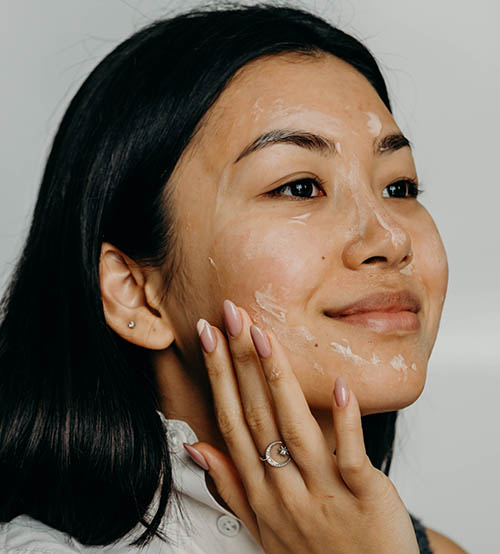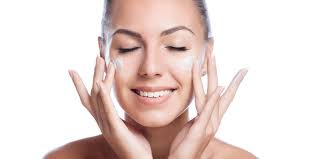Oily skin is a common dermatological condition that affects many people worldwide. It occurs when the sebaceous glands in the skin produce too much oil or sebum, which can lead to a shiny, greasy-looking complexion, clogged pores, and acne breakouts. While oily skin can be challenging to manage, there are many effective skincare products, treatments, and lifestyle adjustments that can help keep it under control. In this blog post, we’ll explore the top Skin Care Routine For Oily Skin that you can start incorporating into your daily routine today.
Daily Skin Care Routine For Oily Skin At Home
Skin Care Routine for Oily acne-prone Skin at Home
Step 1: Cleansing

Cleansing is an essential step in any skincare routine, but it’s especially important for those with oily skin. Look for a gentle cleanser that is formulated specifically for oily skin, and avoid harsh scrubs that can irritate and dry out your skin. Cleansing twice a day, in the morning and at night, is recommended.
Important for You: 8 Steps: How to Use Face Wash Properly
Step 2: Toning
Toning helps to balance your skin’s pH levels and remove any excess dirt and oil that may be left behind after cleansing. Look for a toner that is alcohol-free and contains ingredients like witch hazel or salicylic acid, which are great for oily skin. Use a cotton pad to apply the toner to your face and neck after cleansing.
Step 3: Exfoliation

Exfoliating once or twice a week can help remove dead skin cells, unclog pores, and prevent breakouts. Look for a gentle exfoliating scrub or chemical exfoliant that is formulated for oily skin. Be careful not to over-exfoliate, as this can cause irritation and dryness.
Step 4: Treating
Apply a treatment product that is formulated to target oily skin concerns, such as acne or blackheads. Look for products that contain ingredients like salicylic acid, benzoyl peroxide, or retinoids, as these can help to control oil production and prevent breakouts.
Step 5: Moisturizing

Even oily skin needs moisturizer to stay healthy and hydrated. Look for a lightweight, oil-free moisturizer that is formulated for oily skin. Apply it after toning, focusing on areas that tend to get dry, like your cheeks and jawline.
Suggested Article: Multani Mitti Face Packs Good for Acne and Oily skin
Step 6: Sun Protection

Sun damage can exacerbate oil production and cause premature aging, so it’s important to wear sunscreen with an SPF of at least 30 every day. Look for a lightweight, oil-free sunscreen that won’t clog your pores or cause breakouts.
Night Skin Care Routine for Oily Skin Home Remedies
In addition to following this daily skincare routine for oily skin at home, there are a few other tips that can help to manage oily skin.
1. Face Masks
Using a face mask once or twice a week can help control oil production and improve the overall appearance of your skin. Look for masks that contain ingredients like clay, charcoal, or salicylic acid, which are great for oily skin. Apply the mask to your face and neck, leave it on for 10-15 minutes, then rinse off with warm water.
2. Blotting Papers
Carrying blotting papers with you throughout the day can help control excess oil and shine. Simply press the blotting paper onto your T-zone (forehead, nose, and chin) to absorb any excess oil.
3. Avoid Over washing
While cleansing is important for oily skin, over washing can actually strip your skin of its natural oils and cause it to produce even more oil. Stick to cleansing twice a day, and avoid using hot water or harsh scrubs.
4. Use Oil-Absorbing Products
Using products that are specifically designed to absorb excess oil can help control shine and prevent breakouts. Look for products like blotting papers, oil-absorbing powders, and mattifying primers to keep your skin looking fresh and matte throughout the day.
5. Hydrate Internally
Drinking enough water throughout the day can help keep your skin hydrated and healthy from the inside out. Aim for at least 8 glasses of water per day, and consider incorporating hydrating foods like watermelon, cucumbers, and oranges into your diet.
6. Avoid Heavy Makeup
Heavy, oil-based makeup can clog your pores and exacerbate oil production. Instead, opt for lightweight, oil-free makeup that won’t clog your pores or cause breakouts. Look for products that are specifically formulated for oily skin.
7. Don’t Touch Your Face
Touching your face can transfer bacteria and oil from your hands onto your skin, which can lead to breakouts and irritation. Try to avoid touching your face throughout the day, and be sure to wash your hands before applying skincare products or makeup.
8. Use Salicylic Acid
Salicylic acid is a beta-hydroxy acid that helps exfoliate the skin, unclog pores, and control oil production. Look for products that contain salicylic acid, like cleansers, toners, and spot treatments, to help keep your skin clear and balanced.
9. Try Oil Cleansing
Oil cleansing involves using an oil-based cleanser to remove dirt, makeup, and excess oil from your skin. While it may sound counterintuitive, oil cleansing can actually help balance your skin’s natural oils and prevent overproduction. Look for cleansing oils that are formulated for oily skin, like grapeseed oil or jojoba oil.
10. Use a Clay Mask
Clay masks are great for oily skin because they help absorb excess oil and impurities from the skin. Look for masks that contain ingredients like kaolin clay or bentonite clay, which are great for absorbing oil and reducing shine. Apply the mask once or twice a week, leave it on for 10-15 minutes, and then rinse off with warm water.
11. Don’t Overuse Acne Products
Using too many acne products can actually irritate your skin and cause it to produce more oil. Stick to one or two acne-fighting products, like a cleanser or spot treatment, and use them as directed.
12. Visit a Dermatologist
If you’re struggling with persistent acne or oily skin, consider visiting a dermatologist. They can recommend prescription-strength products or treatments that can help control oil production and improve the overall health of your skin.
In conclusion, achieving healthy, glowing skin with oily skin requires a combination of healthy habits and effective skincare practices. By incorporating these tips and techniques into your daily skincare routine, you can keep your oily skin under control and achieve the healthy, radiant complexion you desire.

